

How much plastic goes into the oceans each year? You might have heard the oceans are full of plastic, but how full exactly?
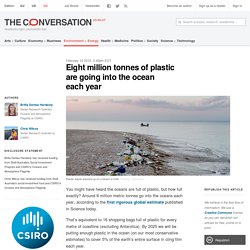
Around 8 million metric tonnes go into the oceans each year, according to the first rigorous global estimate published in Science today. That’s equivalent to 16 shopping bags full of plastic for every metre of coastline (excluding Antarctica). By 2025 we will be putting enough plastic in the ocean (on our most conservative estimates) to cover 5% of the earth’s entire surface in cling film each year. Around a third of this likely comes from China, and 10% from Indonesia. In fact all but one of the top 20 worst offenders are developing nations, largely due to fast-growing economies but poor waste management systems. Garbage Everywhere. In early 2014, I arrived in the southern Indian city of Bangalore, which just two years before had been paralyzed by a garbage-worker strike and a severe shortage of landfill space.
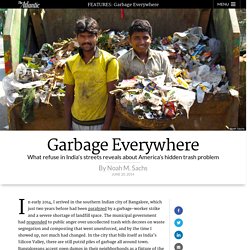
The municipal government had responded to public anger over uncollected trash with decrees on waste segregation and composting that went unenforced, and by the time I showed up, not much had changed. In the city that bills itself as India’s Silicon Valley, there are still putrid piles of garbage all around town. Bangaloreans accept open dumps in their neighborhoods as a fixture of the landscape, to be seen but somehow ignored. Like many other Indian cities, Bangalore has a massive garbage problem—the product of rapid economic growth, overcrowding, poor urban planning, corrosive corruption, and political dysfunction.
As I walked around town and saw Bangalore’s colossal chain of manufacturing, consuming, and discarding, I began to think about my own consumption habits. “Why was it so hard to look at garbage?” Daily Dump. Garbage Everywhere. Waste and recycling statistics. 360 Environmental Limited - Packaging Waste Regulations. Packaging Waste Regulations Are you affected?

What must you do? Producer Responsibility Obligations (Packaging Waste) Regulations 2007. The Producer Responsibility Obligations (Packaging Waste) Regulations 2007, which originally came into effect at the end of August 1997 in Great Britain and in 1999 in Northern Ireland, was the first 'producer responsibility' legislation in the UK.
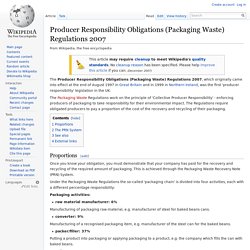
The Packaging Waste Regulations work on the principle of 'Collective Producer Responsibility' - enforcing producers of packaging to take responsibility for their environmental impact. The Regulations require obligated producers to pay a proportion of the cost of the recovery and recycling of their packaging. Once you know your obligation, you must demonstrate that your company has paid for the recovery and recycling of the required amount of packaging.
This is achieved through the Packaging Waste Recovery Note (PRN) System. Under the Packaging Waste Regulations the so-called 'packaging chain' is divided into four activities, each with a different percentage responsibility: National Packaging Waste Database. Packaging Recovery Note. Packaging Recovery Notes can be issued by accredited reprocessors when they have recovered and recycled a tonne of packaging material.
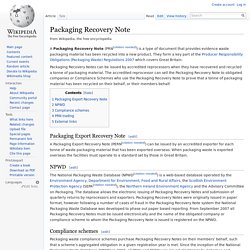
The accredited reprocessor can sell the Packaging Recovery Note to obligated companies or Compliance Schemes who use the Packaging Recovery Note to prove that a tonne of packaging material has been recycled on their behalf, or their members behalf. We could end up with 'as much plastic in our oceans as fish' A failure to address the mountains of waste in the developing world will result in as much plastic in our oceans as fish, the head of Ocean Conservancy has warned.
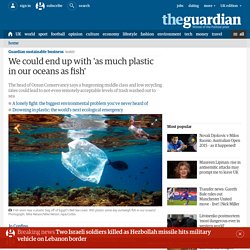
Jeremy Irons: public need to take responsibility for plastic waste problem. People must overhaul their habits of “unadulterated consumerism” if the EU is to curb its huge waste problem, British actor Jeremy Irons told a conference in Brussels.
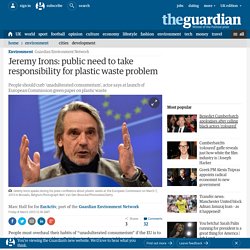
The European Commission hosted the conference with Irons and Environment Commissioner Janez Potočnik to announce the publication on Thursday (7 March) of the EU’s green paper on plastic waste while promoting the actor’s new documentary, ‘Trashed’. The green paper aims to launch discussions about how to make plastic products more sustainable throughout their life cycle and reduce the impact of plastic discards on the environment. “We have to take more time. We're shrinking waste. Recycling electrical equipment Electrical and Electronic Equipment is one of the fastest growing waste streams in the UK, increasing by at least 5% each year.
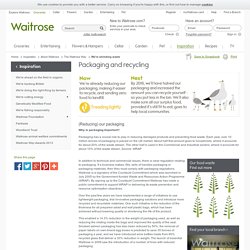
The public dispose of more than 1.2 million tonnes of waste every year in the UK, and landfill sites are now reaching full capacity. Much of this waste can be recycled, and the resources recovered to make new consumer goods. The WEEE regulations aim to reduce the quantity of electrical and electronic items disposed of in this way, and will encourage everyone to play a part in protecting our environment for future generations. From 1 July 2007, the UK’s Waste Electrical and Electronic Equipment (WEEE) regulations allow members of the public to deposit old electrical and electronic items at recycling sites across the UK, free of charge. To find your nearest recycling sites for waste electrical and electronic products, contact your local council, or visit Recycle More and type your postcode into the recycling bank locator.
FAQs. Tipping point: what happens when our landfills are full? Incineration Versus Recycling: In Europe, A Debate Over Trash by Nate Seltenrich: Yale Environment 360. 28 Aug 2013: Report by nate seltenrich For communities short on landfill space, “waste-to-energy” incineration sounds like a bulletproof solution: Recycle all you can, and turn the rest into heat or electricity.
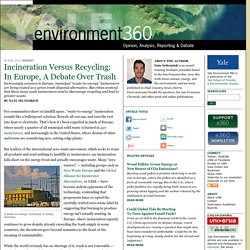
That's how it's been regarded in much of Europe, where nearly a quarter of all municipal solid waste is burned in 450 incinerators, and increasingly in the United States, where dozens of cities and towns are considering new, cutting-edge plants. But leaders of the international zero-waste movement, which seeks to reuse all products and send nothing to landfills or incinerators, say incineration falls short on the energy front and actually encourages waste. Many “zero. Zero Waste? – Zero Waste Europe. “Zero Waste is a goal that is both pragmatic and visionary, to guide people to emulate sustainable natural cycles, where all discarded materials are resources for others to use.
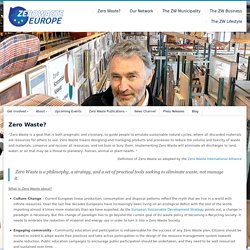
Zero Waste means designing and managing products and processes to reduce the volume and toxicity of waste and materials, conserve and recover all resources, and not burn or bury them. Implementing Zero Waste will eliminate all discharges to land, water, or air that may be a threat to planetary, human, animal or plant health. ” The Dissertation - Information for current students - Department of Social Policy. General guidance This general guidance is to assist with MSc dissertations (long essays). These notes should be read in conjunction with any other specific MSc programme guidance you have been given. Your dissertation provides you with an opportunity to write a substantial piece of academic work on a topic of interest to you. It is an opportunity to produce a work of scholarship, using the academic skills you have developed. Regardless of topic, your dissertation will demonstrate the following skills: Philosophical Disquisitions: Vincent's Structured Taxonomy of Responsibility Concepts.
Nicole Vincent is one the best contemporary philosophers of responsibility. Her work deals with the intersection between neuroscience, criminal law, and theories of responsibility. As it happens, I originally intended to focus my research on these intersections too. Although my research focus has changed somewhat, I still try to read Vincent’s work regularly and when I do I’m always impressed by its content.
In this post, I want to share what I think is (to date) Vincent’s most significant contribution to the philosophy of responsibility: her structured taxonomy of responsibility concepts. The Courtauld Commitment. Extended Producer Responsibility. The free big data sources you should know. ASDA and Marks & Spencer lead assault on packaging waste crisis - but will it work? - Investigations. There’s not much a joint of beef can do to be offensive. Unless you’re vegetarian, in which case steering clear of the meat aisle in the supermarket is probably the best option.
Lincolnshire trading standards, however, did have a problem with a Sainsbury’s Taste the Difference joint. It wasn’t too big, it wasn’t too small, it wasn’t claiming it was delicious when it actually didn’t have much on a bog-standard burger. Welcome — SITA UK. Review Article: Extended producer responsibility for packaging wastes and WEEE - a comparison of implementation and the role of local authorities across Europe.
Rachel Cahill David C Wilson. Compliance Costs – PRNs and PERNs - Recoup Recycling. What costs are involved in Compliance? Businesses that have an annual turnover of more than £2 million and handle more than 50 tonnes of packaging per year must meet the recovery and recycling obligations set out by the Producer Responsibility Obligations (packaging waste) Regulations. All businesses affected by the Obligations must register with one of the regulatory/enforcement bodies - the Environment Agency (for businesses in England and Wales), the Scottish Environmental Protection Agency (SEPA) (for businesses in Scotland) or the Northern Ireland Environment Agency.
If you choose to complete your Obligations via a Compliance Scheme you will usually need to pay an annual subscription to the scheme you choose (in addition to your annual registration fee paid to the regulatory body). The price includes taking over the legal responsibilities of processing your Obligations using data provided by you. What are PRN's/PERN's? Plastic packaging waste statistics 2012: 34% recycling, 35%energy recovery and 31% landfill - Recoup Recycling.
EPR – Extended Producer Responsibility – Zero Waste Europe. Do I need to register? Do I need to register? The Packaging (Essential Requirements) Regulations 1998. Waste Framework Directive (Directive 2008/98/EC on waste) - Recoup Recycling. Directive 2008/98/EC sets the basic concepts and definitions related to waste management, such as definitions of waste, recycling, recovery. A Sea Full of Trash. Beyond the landfills and trash heaps moldering in almost every town and city across the globe, manmade garbage has found its way into the natural landscape on a mind-boggling scale. It seems as though there are virtually no places left on Earth free of our rubbish. Why do we have so much garbage, & what can/should be done to reduce it? Circular Economy. The History of Plastic - Recoup Recycling. The development of plastic materials started with the use of natural materials with plastic properties then evolved with the development of chemically modified natural materials (e.g., rubber, nitrocellulose, collagen) and finally the wide range of completely synthetic material that we would recognise as modern plastics started to be developed around 100 years ago.
The first man-made plastic was created by Alexander Parkes at the 1862 Great International Exhibition in London. Today known as celluloid, the material was called Parkesine derived from cellulose that once heated could be molded, and retained its shape when cooled. In 1907 Leo Baekeland created Bakelite, the first synthetic mass-produced plastic. In 1933, polyethylene was discovered by Imperial Chemical Industries (ICI). Addicted to Plastic (Documentary) Waste Framework Directive (Directive 2008/98/EC on waste) - Recoup Recycling. Legislation and Strategy - Recoup Recycling. Find Out More About Plastic and Packaging - Recoup Recycling. Mmission Speaker Questions Waste Policy At RECOUP Conference. At the recent RECOUP Plastics Recycling Conference, Dr Helmut Maurer from the European Commission’s environment department – working on waste implementation issues for sustainable production and consumption – questioned whether resources should really be addressed through waste policy.
Recoup Recycling. Courtauld 2025 - Securing a more resilient future together. Planning and conducting a dissertation research project. This guide addresses the task of planning and conducting a small research project, such as for an undergraduate or masters’ level dissertation. Packaging. Managing municipal solid waste - a review of achievements in 32 European countries. Report Comparativo_final.pdf. Www.oecd.org/officialdocuments/publicdisplaydocumentpdf/?doclanguage=en&cote=env/epoc/ppc(97)21/rev2. INFORM - Executive Summaries Archive. Executive Summaries Archive Fact Sheets & Summaries > Waste Prevention > [Germany, Garbage, and the Green Dot: Challenging the Throwaway Society] Germany, Garbage, and the Green Dot: Challenging the Throwaway Society The Federal Republic of Germany has initiated the world's most ambitious national solid waste policy, one that already has had international repercussions.
Jakarta's $40 Billion Plan To Stop Sinking Into The Ocean. Plastic impacts on the natural Environment. Wp-content/downloads/wor1/WOR1_english.pdf. Litter « World Ocean Review. Deposit system law - Denmark. Denmark has had a deposit/refund system for decades, but initially it was only applicable to refillable beverage containers. Many shops and supermarkets have had Reverse Vending Machines for years to automate the reverse vending process. Www2.mst.dk/udgiv/publications/1998/87-7909-014-1/pdf/87-7909-014-1.pdf.
The Great Danes.